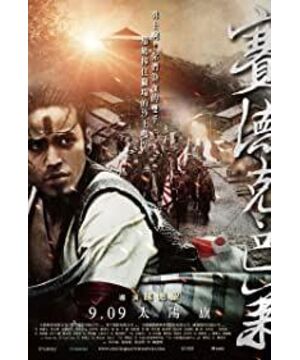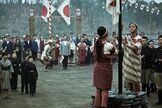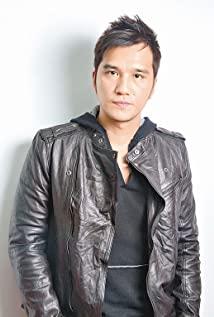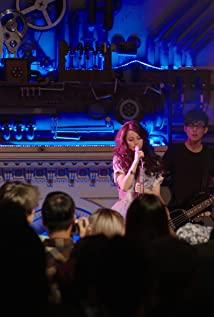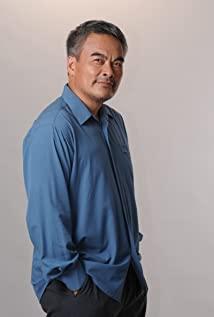[Front press: "Sedek Bale", I really started watching it from Rainbow Bridge, and after a year, I had the opportunity to watch Tai//Yang//flag...]
Unexpectedly, the story started from "The Treaty of Shimonoseki", when Taiwan//Wan Island changed the ruler//governor/.
"Our ancestors never let aliens into the tribe, but I let them be kings here. I'm not reconciled." The young Mona Rudao crouched in the left corner of the front row of the crowd, pointed by the Japanese, and then he Hate to say this.
In the face of the sudden aliens, the deterrence of steel guns and cannons, even the most sincere and brave Sediq Bale can only remain silent. Mona Ludao has spent nearly 30 years accumulating gunpowder by deducting match heads, waiting for an opportunity to take revenge...
When blood sacrificed to the ancestors, the Tibetan women in uniforms asked, "Why do you want to create grass?" Faced with the sudden disruption of the so-called civilized order, there is a hidden curse on the barbaric mob. Perhaps we can use the answers that Dutches, who expected himself to be a civilized person, got in the forest, in the hunting ground of Mona Rudao himself: shops, post offices, schools, hotels, medical institutions, so that the lives of the tribe can be lived. okay? Instead, let them see how poor they are.
Before that, Dutchess thought he "doesn't have to live by savage hunting/killing as before."
Poor and rich, barbaric and civilized. The meanings of the phrases, due to the standpoint and the different understanding of the phenomenon, will produce diametrically opposite ambiguities. For example, in terms of material and spiritual coordinates, the conclusion is particularly obvious.
The lower-level Japanese officers saw the improvement of living conditions in the tribal market town, and showed their self-confidence; but they did not know that the senior commander drew his saber, referring to the rich forest and mineral resources. Dutchess thought that wearing a clean uniform was the embodiment of civilization, but he didn't know that behind the so-called civilization, "Is it cured by Japan//human rule//? Men are forced to bow their waists to carry wood, women are forced to kneel to help their servants to accompany the wine... "
Adults are good at pretending, but children are not. So "what your hunting ground, my hunting ground, all belong to us Japanese." To put it bluntly, people are here to rule, how can it be possible to give you the dignity and equality of being a real human being.
Mona Rudo's father died on his back, leaving the new leader of the tribe with the last words: "Never let aliens enter the tribe."
He often taught his son to "obey the rules of the ancestral law and be a real person."
It's a pity that now "those trees that have seen our ancestors have now become such wood."
Mona Rudo had been to Japan, so he knew "how powerful" the Japanese planes, artillery, and ships were. As a ruler, the most powerful trick of the Japanese is to exploit the contradictions between the tribes and tribes. "They will do this." Using bait and tricks to make ignorant people kill each other is the best management method. However, this cannot deceive the conscience, nor can it deceive the wise man who understands the root cause.
Although the aged Mona Rudo still considers himself a hero, and has no less hatred for the Japanese than the young, he still bears it. Waiting for the opportunity, you must not "only know how to hunt, but don't know how to control the hound..."
Even heroes have a dilemma. Because "you know that you will lose this battle, why do you still fight?"
"For the soon forgotten totem!"
"To exchange your life for the totem mark, what will you exchange for these young lives?"
"pride!"
"—If your civilization is to make us bow down, then I will show you savage pride!"
Figure // Teng's mark, in the final analysis, is just a sign of becoming a real person; in a vulgar way, it is actually defending one's hunting ground. Even for the practical, there is a fear of the future. Epic movies naturally have poetic language to express:
"Men who haven't taken the enemy's head and women who are not good at weaving are not qualified to have tattoos on their faces. One day, their souls were gone, and when they arrived at the Rainbow Bridge for verification, they guarded the bridge. The ancestors looked at their clean faces without totems and said, are you my children? Go back! Go back! Go back! You are not the real Sediq! You are not qualified to enter the home of the ancestors!
For a moment, their faces were unkempt, their souls dazed, and they made their way round the bumpy valley in shame. Their mourning ghosts//souls were cut into unbearable pain by the poisonous crabs guarding the valley..."
The fear of being abandoned by the ancestral spirits is like the wailing of a lonely ghost without a destination. So "Sedek Bale can lose the body, but must win the soul!" So, when Mona Rudao decided to blood sacrifice the ancestral spirit, the son of another tribal chief relayed his father's words: "Please take the child with you. They make marks on their faces..."
The totem imprint is a kind of honor and a qualification. "Look at these young people, with white faces and no totems that Sediq should have. Do you have the heart to watch their dead souls, abandoned by their ancestors, or do you think they are not qualified to be a Seid with blood on their hands? Kerbale!"
No one has the right to deny others the opportunity to be proud, and no one has the right to replace the qualifications of others to be brave. In fact, everything is still to be won by oneself, rather than relying on the gifts of the leader (or ruler). Because these white-faced young people understand: "Our lives are exchanged for the blood of our ancestors, and we have to bring our descendants to dye red battle clothes! We are Sediq Bale!"
Poetic rhetoric still cannot change the fact that the family is about to be exterminated. Heroes become heroes because they know the consequences before they act, not because they are blinded by bullshit or made up of puppets//images. Only convincing and admirable heroes, before being heroic and righteous, can say these words with extraordinary significance:
"Children, on the other side of the rainbow bridge leading to the ancestral home, there is a fat hunting ground. Our ancestors are all there! That hunting ground that only heroic souls can enter, must not lose... Clan. O my clan! Hunt down the enemy's head! We can't hold the hunting ground in the high mountains of Wushe, and wash the soul with blood! Enter the rainbow, the eternal hunting ground!
This is blood sacrifice to the ancestors! Young people, let the ancestral spirit reside in your blade, and store your hatred in the clouds and mist, and act! "
Only the interpretation of a true hero will be meaningful. This is not a substitute for someone who "can only show off your bravery with animal bones".
The Wushe Incident occurred in 1930. The movie "Sedek Bale", which was changed by real historical events, expressed his admiration for "Rainbow Bridge" two years ago, and only watched its upper part "Sun Flag" not long ago. The dimension of time did not erase the shock brought by the original viewing.
According to Gao Jinsumei: "In the eyes of the aborigines, Taiwan is only divided into the Han and the aborigines. We don't have the concept of a country, but only the concept of ethnic groups and ethnic groups. Just like the movie "Sedek Bale" said Yes, we know exactly where the territory of our own ethnic group is. If you come to our territory, we must make a draft. The Japanese colonial era hurt the aborigines the most. They used violence and so-called laws to restrict the aborigines. life, depriving us of our land..."
Can explain the question in the film: "Dutches, are you going to enter the Japanese shrine in the future, or the home of our ancestors?" If it is converted into the status quo, can it be understood that you are going to become a yellow//// Russia, support /// that, or the descendant of the dragon. It is a pity that many people cannot understand the concept of home and state and the meaning of state.
Think about the phrase "Bawan, where is your hunting ground?" This is a counter-examination. If you don't fight for it, where will you have your own status. Throughout the whole film, whether or not the concept of the nation and the ethnic group is recognized, and in fact the manager (also called the ruler) has been changed, the difference in the living conditions of individuals and groups should be self-evident.
Although the Japanese hung a plaque saying "Wu can tolerate and break" in the martial arts training ground, and their arrogance seemed to be lofty and impeccable, but it did not change the fact that they were aggressing and enslaving others. No matter how splendid the position you preach, the factual basis can reveal the brutal nature in private.
The veiled surface hides murderous intent. It has been nearly a hundred years since the Wushe incident, and the scary mark comes from the sudden massacre that seems to have no warning. What is the difference between a racially antagonistic enemy and an incompatible enemy? Within the red line, you were originally a good person or a bad person. Is it still useful at that time?
This brings a warning: Be a man not to go too far, and your rule must not be too cruel. The false surface of stability and prosperity that relies on lies and intimidation will one day be exchanged for a bloody and tragic confrontation...
Appendix:
❶ Sediq Bale, meaning "real person".
❷The film "Seediq Bale" is four and a half hours long, and it is divided into the first episode "Sun Flag" and the second episode "Rainbow Bridge".
View more about Sai de ke · ba lai: Tai yang qi reviews


